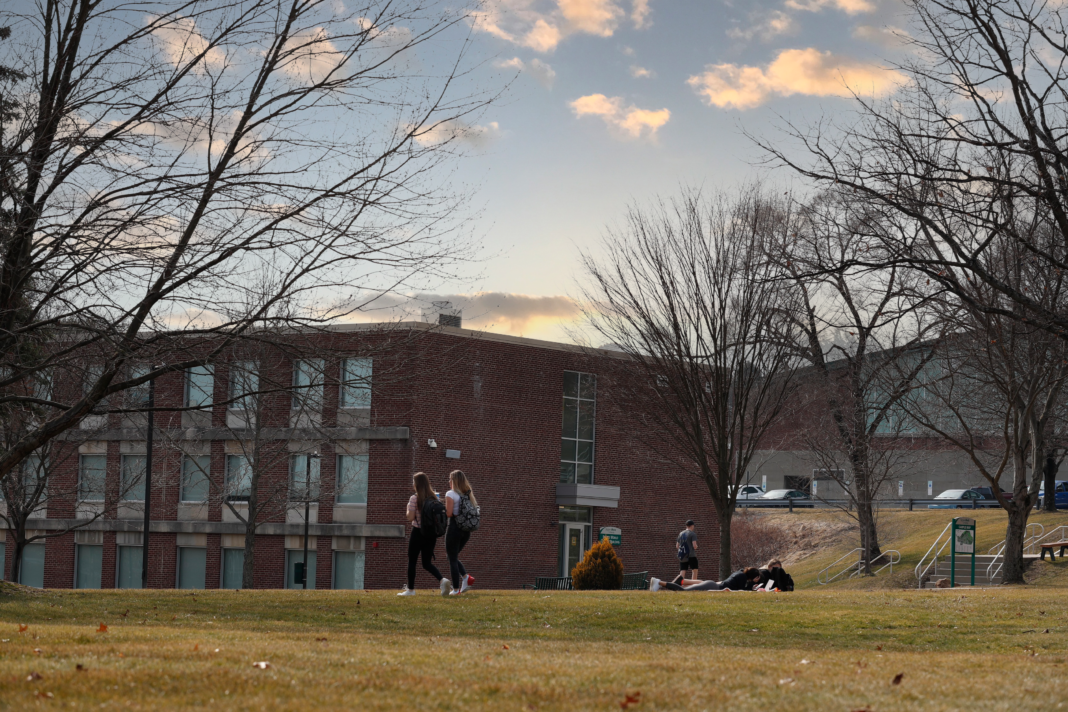CONTENT WARNING: This article contains mentions of mental health and students’ struggles since the start of the pandemic.
Editor’s note: Certain student identifying information, including last names and majors, are not included in this article at the request of each student.
On March 11, 2020, SRU students were on spring break and spread out from the community. Some were still in Slippery Rock, some were at their home with their family and others were on trips out of state.
However, that day was the moment when all students received the same email: “SRU COVID-19 Update: Spring Break Extended Two Weeks; Instruction Moved Online.”
Now, after a year into the pandemic and a year of learning through D2L and Zoom, underclassmen look forward to returning to a somewhat normal capacity in the fall 2021 semester. However, this year has proven difficult for students, especially in regards to mental health.
The initial shutdown and virtual learning
Emily, a sophomore at SRU, was at home. It was a nice day outside, she said, and she was on a walk with her friends. When she came home, her mom asked if she had heard the news: SRU extended its spring break.
“Oh no, this isn’t good,” she said, shaking her head. “A lot of things were going through my mind. I have friends that live far away, and that was the last time I saw them.”
Emily said she “didn’t think too much” about her mental health because she thought she was OK. But it got worse as time went on.
“I thought I was doing alright,” she said. “Quarantine was pretty rough. I’m a very social person. I love to talk, and interaction is my thing. But, there wasn’t much to do.”
She added that she spent a lot of time with her family, which she enjoyed. But she yearned for social interaction.
“I felt trapped,” she said. “I felt stuck. I didn’t feel like I was progressing forward.”
Samantha, a senior at SRU, was also enjoying nature in Nashville, Tennessee with her friends. When her friends got the email, they all stopped at a local restaurant parking lot and cried together.
The spring 2020 semester was the most intense one for Samantha. Not only were exams difficult for her major in March of 2020, but she felt disconnected from everyone and was not dealing well with school and moving back home.
“I just felt so disconnected from literally everyone I knew because I wasn’t in that environment,” Samantha said. “It wasn’t great. It was actually a big wake up call.”
However, July was one of her worst months, as the anticipation of returning to SRU increased her anxiety. However, she ultimately felt comfortable with her multimodal classes as there were fewer students in the room.
“July was like one of the worst [months] because it was so close to going back to school and it was just the anticipation of ‘What’s it going to look like?'” Samantha said.
Hannah, a sophomore, was at her former high school’s musical when she got the email. She originally saw the message as an added opportunity to be home with family, but two weeks into the pandemic, she didn’t want to do anything.
“I just remember being so anxious because we just didn’t know,” Hannah said. “I remember running through Giant Eagle to get in and get out. Otherwise, I didn’t want to do anything. I didn’t want to talk to anybody.
According to Kenneth Messina, the clinical director of SRU’s Counseling Center and associate professor, the majority of students during the March-May 2020 “shutdown” shared similar thoughts to Emily, Samantha and Hannah: increased anxiety and feelings of isolation, but with a temporary feeling.
“I think there was just a lot of anxiety about what’s next, but I think it was more hopeful,” Messina said. “I think that was one of the things that students struggled with was the isolation, but it had this temporary feeling to it.”
Messina added that this time was more logistically focused, as students had to focus on time management and adjusting to online learning.
Mental health in the fall 2020 semester
Leah, a freshman at SRU, lives off campus at home. She said because she doesn’t live on campus, she has less resources available to her that could have been beneficial. She is “not doing too well” from an academic standpoint, and she said this negatively affects her mental health.
“I’m failing one of [my classes],” she said. “So that definitely affects [my mental health]. Isolation and everything doesn’t help either. I feel like it might honestly be worse on campus because at least I have my family when I’m here… But I feel like if I was on campus, I would just be alone and sad instead of [at home] and sad.”
For Victoria St. Claire, a senior elementary education/special education major, the fall 2020 semester was “as up and down as it could have been.” She described this as a mundane time for her, as her original plans for activities and events for the year were all cancelled.
“Every month I had something very major, and none of it happened,” St. Claire said. “I feel awful saying that because people obviously had it worse, but I don’t know, it’s something I’m dealing with. It was hard to do nothing and it was very mundane.”
The fall semester also posed challenges for Brett Hardy, a junior music education major, as he missed having daily interaction with other students and professors. But conversations with his professors in the fall 2020 semester changed his perspective on the multimodal semester.
“I had one or two classes in person, so a lot of my other classes were online and I didn’t get that human interaction, but it was about midway through the fall semester I would say where I had a change in mindset,” Hardy said. “I kept feeling sad for myself and all, but I talked with a lot of my professors and I had a change in mindset where I know I can’t control the situation, but I can control the way I feel about it.”
The fall 2020 data
Through SRU’s Counseling Center, Messina, John Mathe (assistant professor and counselor) and Megg Spierto (counselor) created a survey to study how the COVID-19 pandemic has impacted college students’ mental health in the fall 2020 semester. This survey was sent to all SRU students to complete anonymously via email in late October 2020. At the end of the survey, 716 students responded.
Unlike some other college counseling center studies, this study included the general student population as opposed to only students who use university counseling mental health services.
“One of the unique things was a lot of the numbers that we see floating out there are based on counseling center only populations on college campuses,” Messina said. “So this was university wide, and so that gave us a better kind of understanding of where all of our students are, not just the ones that are coming for counseling, but everybody.”
In the survey, 84% of students indicated that they had worse anxiety and 65% of students had worse depression.
There was no change in completing assignments or attendance, but students reported worse focus and concentration. The majority of students in the study also reported reduced feelings of motivation.
“When we look at the isolation that’s been happening, those numbers didn’t really surprise us,” Messina said. “So we know that students are anxious. We know students are lonely. They’re missing that in-person feel. They’re feeling stressed because of all the different pulls and demands on them right now, so it gave us a really good look at how are the students of Slippery Rock doing and what are the big things, and we saw motivation took a huge hit.”
Concerning workload, 77.25% of students felt overwhelmed or overworked in the fall 2020 semester.
According to Messina, one of the more encouraging statistics was that almost 84% of students had no changes in thoughts of self-harm and suicide. Additionally, 82% of students reported no increase of substance abuse.
“That was really encouraging because even though we’re seeing the stress level increase, even though we’re seeing these depress symptoms increase, it’s showing us that those high-risk behaviors aren’t increasing. We’re not having more suicidal thoughts.”
Specific recommendations from this study included the promotion of resources to students, increasing grace and flexibility from staff and recognizing student burnout and getting creative to address it.
Also during the fall 2020 semester, the Slippery Rock Student Government Association (SGA) organized its annual Student Life Survey. While there were no questions specific to mental health, multiple students left additional comments concerning their mental health:
- “Classes being online has [affected] my learning & mental health in a very negative way. We discuss prioritizing mental health, but don’t match our actions to our words. Other campuses across the state are back in person, so why can’t we be?” one junior said.
- “I wish that we had a few days off here and there this semester (even if it was a random Wednesday or something) as towards the end of the semester I have gotten burned out and am ready to be done even though we still have a little bit of time left in the semester,” one senior said.
- “Can you all please do something about breaks? We need a group to advocate for students to have a break because we are burned out, exhausted, and do not feel well represented in that regard,” one junior said.
- “I know from my own personal experience, and all of my friends, that being online and trapped inside every single day over and over has absolutely taken a toll on our mental health. I don’t even feel like myself anymore. I feel like even just being around others would be nice,” another senior said.
In an emailed statement, Leif Lindgren, the vice president of student and academic affairs for SGA, said that he will share more of these notes with the executive board and SGA president.
Student mental health a year into the pandemic
Emily is “very relieved” to be back on campus this semester. Being employed at the SGA Bookstore in the Smith Student Center, she said she’s happy to be back in person and interacting with people.
“I’m interacting with people, which is nice, because I didn’t have that in the fall,” she said. “This gives me a little bit of relief and hope for next fall that this will all get back to normal for us.”
Leah said her mental health is “not that good” because her academics largely contribute to her mental well-being. But, she feels that her mental health would be even worse if she were on campus. She hopes that as summer approaches and there are less pressures on her, her mental health will improve.
An end to the pandemic in sight
Emily said the vaccine has been “a good reliever” for a lot of people and helps them feel better about being around others who are vaccinated. “People will feel more connected,” she said, and won’t feel so “isolated from the world.”
“I see more light at the end of the tunnel now that things are progressing forward a little bit,” Emily said.
Leah said the development of the COVID-19 vaccine has made her less nervous and changed her perspective. She added that her mom, who works in health care, has already gotten her vaccine.
She hopes that the vaccine will eventually decrease COVID-19 case numbers on campus and make people “less concerned” about the pandemic.
“We should still follow our procedures, though, with masks and social distancing, but hopefully more people can get access to vaccinations and then we can be safer,” Leah said. “I think as we all get vaccinated and see its effects, then we can make our regulations be a little more lenient in the future.”
Leah said that the weather positively affected mental health, adding that when she can see the sun and the sky, it “definitely improves things.”
“Seasonal depression is a real thing,” she said, “and it definitely affects people. It had to have been even worse [for people who are] stuck at home.”
Looking forward, Messina believes that there is a sense of hope with the end of the pandemic in sight. While he expects a return to pre-COVID-19 levels of stress and anxiety, especially as social connections make a return, he also expects a sense of fear with the uncertainty and anxiety over the next big changes.
“We’ve already been through this once to some degree,” Messina said. “There’s the ‘What’s next?’ mentality that will kick in. With that comes a lot of worry, which increases our anxiety and stress, so I think we’ll hopefully see greater social connections, but I think we’re also going to see a lot more students that are probably going to be coming for services because of become back on campus and because of having to deal with this very traumatic experience over the past year.”
Where do we go from here?
Emily said she recognizes that “everyone is struggling right now, and we do need to take care of ourselves.” When she gets stressed and burnt out, she takes breaks and does things she enjoys, like being outside and hanging out with friends and family.
“I think knowing everybody’s in the same boat, but we’re there to help each other and talk through it,” she said. “That really helps a lot, and I would say I’m doing a lot better now.”
For self-care practices, Emily has been focusing specifically on creating a skincare routine and meditating. She said it’s also important to relax the mind as well, so she likes to complete crossword puzzles, read books and journal.
She emphasized social interaction as one of the main ways she alleviates stress.
“I have to talk to people,” she said. “I wear my emotions on my sleeve, and I cannot bottle it up because it makes me even more anxious and stressed out. I usually talk to my family or friends, and they really help to put things into perspective and calm me down a little bit.”
Leah said she’s had a decline in self-care recently but wants to get back into exercising like she used to.
“I just haven’t had the motivation, the energy in so long,” she said.
But she said she likes to do face masks to maintain basic self-care. She also keeps her workspace clean and organized to make it easier to focus.
“For me, my workspace is my bedroom,” she said. “What I try to do to make it easier to sit and work is make sure that the floor is cleared at least. I also try to make sure that the laundry isn’t overflowing because if I can see it, it’s going to distract me.”
When Leah gets stressed, her go-to de-stressor is consuming any type of media, like watching movies, YouTube videos and listening to music.
Like Leah, Hannah also relies on digital content to continue interpersonal connections. For her, while she still missing physical connections with friends in person, she makes sure to schedule monthly movie nights and phone calls with friends.
“I think that’s been the hardest on my mental health, not being around my friends and other people,” Hannah said. “[It’s] just making time to either call my friend in between a class, or we set up like monthly movie nights where a few of us get on Netflix party or we get on Zoom or whatever and talk.”
For St. Claire, who is set to graduate from therapy next month, finds herself as an advocate, especially for showing the importance of medication in treatment for mental health.
“I had taken antidepressants and they had to be increased multiple times from the start of the pandemic to now,” St. Claire said. “I think that’s something that a lot of people are afraid of, but if you have an injury, you take medicine to get better. If you have a wound, you put medicine on it to make it better. Your brain is something that can get sick, and being able to allow yourself to do things to take care of it even more, I think a lot of people are really scared of that.”
And for Samantha, being in nature, especially as springtime is arriving, is part of her self-care. When she was inside, she used a yoga and meditation app daily for over two months.
“All I need is 10 minutes and that’s enough, just that moment to yourself, literally just being with yourself,” Samantha said.
At the counseling center, Messina emphasizes to students to remember that support is available and to not wait to get help when needed.
“I think the biggest thing for students is to not lose hope and don’t forget there’s people here to support them,” Messina said. “There is support available. We’re here just like every other office on campus, to make sure that students are doing well and that they have the tools to be successful here at Slippery Rock. If anyone’s struggling, don’t wait, make an appointment.”
For more information on resources available through SRU’s counseling center, call 724.738.2034, email scc@sru.edu or visit SRU’s website.








